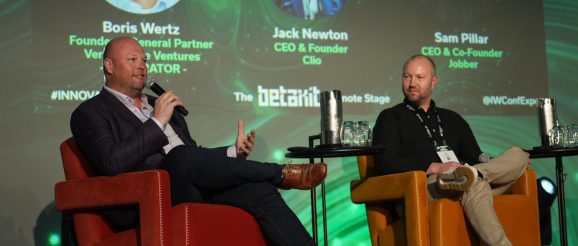INNOVATEwest: Vancouver’s newest tech conference plays host to capital gains and local innovation debates | BetaKit

INNOVATEwest, a new Vancouver-based tech conference hosted by the organizers behind SaaS North and TechExit.io, made its debut on April 16 to a packed Vancouver Convention Centre. Speakers from across Canada delivered insights and hot takes on the BetaKit Keynote Stage. Those hot takes kindled into a blaze when news of planned changes to the capital gains tax outlined in the new federal budget reached conference-goers and speakers. The controversial proposal would see an increase in the inclusion rate on capital gains from one-half to two-thirds on gains exceeding $250,000. Notable panelists such as Clio’s Jack Newton and Version One Ventures’ Boris Wertz joined the chorus of voices from the Canadian startup community in lambasting the hike. Wealthsimple CEO Mike Katchen told BetaKit that the proposed changes made him “extremely nervous.” It isn’t just established members of Canadian tech complaining, either. One young founder told BetaKit that the proposed changes are “disappointing, to say the least.” After presenting her startup, avo—a proposed crypto-trading app that promises to “spy on the rich and famous”—at INNOVATEwest’s Grizzly Pitch, new entrepreneur Anjali Dhaliwal said “Canada seems to be pushing founders away and hurting innovation.” Dhaliwal, whose six-month-old company is part of the very early-stage investment firm Antler Canada’s latest cohort, claimed her team is seriously considering a move to the US in the next few months, citing a lack of support and incentives to stay north of the border. However, despite widespread concern about the inclusion increase, the panel titled “Global Scaling Strategies: Navigating the Unique Challenges of Scaling in Canada,” showcased a different perspective. Hamed Arbabi, founder and CEO of VoPay, struck a more moderate tone during the panel, stating, “I think Canada is still a growing economy. There are so many great companies that started in Canada and are still growing in the Canadian market.” Ramesh Jayakrishnan from Mastercard added to this sentiment, highlighting the potential impact immigration could have on the tech community: “We see companies from Canada emerging and going out … the market is so global … In 2022, we had about half a million people coming into Canada, and the majority of them were within the ages of 22 to 39, which is a ripe age to work with new products.” These statements come amid concerns that top tech talent could be driven away by the capital gains hike’s impact on employee stock ownership. In a statement to BetaKit, Vancouver Mayor Ken Sim expressed similar concerns about the policy. “We are concerned about the impacts of the capital gains tax increase on our local start-up community, as well as on foreign and domestic investment, both of which are essential to our local economy … We will continue to seek out opportunities to grow our city’s economy and maintain our status as a global hub for innovation,” he said. When asked how the capital gains tax would affect the province’s innovation ecosystem, the BC Ministry of Finance gave BetaKit a list of already implemented innovation programs and declined to comment further. Vancouver Collisions While the budget did not manage to fully eclipse Vancouver’s newest tech conference, INNOVATEwest’s host city was another topic of conversation. Vancouver had been in the running to host Web Summit’s Collision Conference before Toronto signed a bridge deal to keep the conference in the city through 2024. INNOVATEwest, a conference reminiscent of Collision in terms of layout and structure, has since filled the void of a major technology conference in Vancouver. Multiple sources familiar with the process speaking to BetaKit have confirmed that Vancouver has made a bid to host Collision after this year, but this group remains split on the bid’s prospects against those of Mexico City, reportedly a leading host city candidate. While Vancouver is emerging as a global startup hub, not everyone is convinced that the city is on a fast track to becoming Canada’s Silicon Valley. On a panel at INNOVATEwest, Lisa Shields, CEO of FISPAN, reckoned that “the big bets that funders are going to be making are going to happen elsewhere.” Markus Frind, founder of Plenty of Fish, added to this, claiming Vancouver “doesn’t have that depth of talent that other cities do.” This sentiment runs contrary to Vancouver’s growth statistics as a tech ecosystem. From 2021 to 2022, Vancouver’s technology sector saw an increase of 22,300 jobs, amounting to a 44.2 percent bump. Additionally, this seems to be a part of a trend that has seen the total tech workforce in British Columbia almost triple since 2010. According to Mayor Sim, maintaining that growth is part of his agenda. “Our city’s vibrant start-up ecosystem, spanning VR/AR, biotech, and film production, is a testament to our business-friendly approach,” he told BetaKit. “We will continue to seek out opportunities to grow our city’s economy and maintain our status as a global hub for innovation.” With files from Douglas Soltys. Feature image courtesy INNOVATEwest.
